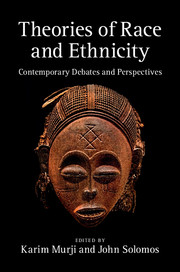Book contents
- Frontmatter
- Contents
- Notes on contributors
- Preface
- 1 Introduction: situating the present
- Part I Debates
- Introduction to Part I
- 2 Race and the science of difference in the age of genomics
- 3 Color-blind egalitarianism as the new racial norm
- 4 Getting over the Obama hope hangover: the new racism in ‘post-racial’ America
- 5 Does a recognition of mixed race move us toward post-race?
- 6 Acting ‘as’ and acting ‘as if’: two approaches to the politics of race and migration
- 7 Can race be eradicated? The post-racial problematic
- Part II Perspectives
- 15 Conclusion: back to the future
- Index
- References
6 - Acting ‘as’ and acting ‘as if’: two approaches to the politics of race and migration
Published online by Cambridge University Press: 18 December 2014
- Frontmatter
- Contents
- Notes on contributors
- Preface
- 1 Introduction: situating the present
- Part I Debates
- Introduction to Part I
- 2 Race and the science of difference in the age of genomics
- 3 Color-blind egalitarianism as the new racial norm
- 4 Getting over the Obama hope hangover: the new racism in ‘post-racial’ America
- 5 Does a recognition of mixed race move us toward post-race?
- 6 Acting ‘as’ and acting ‘as if’: two approaches to the politics of race and migration
- 7 Can race be eradicated? The post-racial problematic
- Part II Perspectives
- 15 Conclusion: back to the future
- Index
- References
Summary
When I was arrested after the police had invaded Saint-Bernard, two events seemed significant to me.
The first is the way I was stripped by policewomen in front of my daughter. It was obvious that their aim was to humiliate me, to break me. So I stripped amid sarcastic comments and questionable jokes. ‘She’s not being that clever anymore, the spokeswoman,’ or ‘You’re not supposed to wear a bra inside out’ (a man wouldn’t have thought of that). But the nature of the mocking, the sarcastic comments and the gibes also said much about the state of mind of the police: ‘Aha! the spokeswoman doesn’t have her mobile phone anymore.’ The mobile phone had become the symbol of the modernity to which, as a foreigner, as an African, as a black woman, as a Negro, I had no right: ‘They’ve hardly come down from the trees, and they already have mobiles in their hands.’
The second one was that I was immediately taken to court, even though I had a perfectly valid leave to stay. It was obviously another attempt to break the symbol represented by an African woman chosen to be the spokeswoman of her comrades in struggle. And for this, they were prepared to commit many illegalities: they did not themselves respect the laws which they praised so much.
During that whole period, we had many identities to reestablish.
– Madjiguène Cissé, The Sans-PapiersThe woman who spoke these words, Madjiguène Cissé, became the symbol of the struggle of the sans papiers – literally migrants ‘without papers’ – for regularisation and for justice in France in the 1990s. In this chapter, I consider the role of racial identity in the political mobilisation of undocumented women in France, the sans papieres – the term papieres, with an -es, is the feminine version of papiers – when, as we see in Cissé’s words, identities are multiple and serve both as a site of challenge and as a resource. I consider two understandings of the role of race in migration politics. In one, interruption of and extraction from existing identities and hierarchies are essential to becoming a political subject and are expressed in the thought of French philosopher Jacques Rancière. In the other, mobilisation occurs within an interlocking matrix of oppression, constituted by race, gender and other identities, as proposed by Patricia Hill Collins.
- Type
- Chapter
- Information
- Theories of Race and EthnicityContemporary Debates and Perspectives, pp. 94 - 113Publisher: Cambridge University PressPrint publication year: 2014
References
- 2
- Cited by



